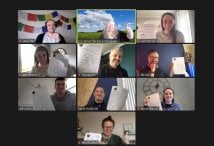The struggles of bringing people together when working rurally
Living and working rurally can bring added challenges to the sense of loneliness we’re all susceptible to. Thanks to our partner Neptune Energy we were able to fund our Rural Connections programme, delivered by our founding charity Change Mental Health, to help build mental health awareness and address isolation in areas like rural Scotland. We spoke to Iona from Creatomatic, a web design and development agency in Lockerbie, Dumfries and Galloway, about their experience of the programme.

What challenges do you think living rurally brings to your wellbeing and the wellbeing of your team?
For us, we have a number of employees spread across Dumfries and Galloway and up in Glasgow. The fact that our business is located in a region with a small population and poor infrastructure has its struggles, many of which have become evident with everyone working from home in the pandemic.
Getting together as a team outside of work can be tricky because of our rural location and what’s on offer locally. Things like rural broadband, poor public transport options and the reliance on driving/having a car mean that things which might be second nature to those living in a city are often hurdles we have to navigate.
That being said, there are plenty of positives to living rurally too! The ability to get out into the countryside and fresh air is something that we all take advantage of regularly, whether it’s on foot or two wheels, and we were able to get to know our region during the time spent at home during the pandemic.
How has the pandemic affected your staff team, in particular with regards to isolation and connections?
For us, one of the biggest issues has been going from being in an office together every day (or most days) to having to communicate solely online. Of course, programmes like Zoom and Slack mean that we can keep in touch, but we’ve missed that connection that comes from just popping over to someone’s desk or going out for a walk on your lunch break with a colleague.
We work in a creative industry and this is one of the things that has been impacted the most with working from home — the organic ideas and conversations that come from being part of a team.
The pandemic and home working has meant it’s harder to notice when people aren’t feeling themselves, but we meet regularly online, aim to check in with each other as often as possible and have a very open-door policy, even if that door has had to be virtual over the past couple of years!
We’ve always been very flexible with people being able to work from the home/office as required, but for a lot of people the pandemic has really highlighted the positive connections that come from being in a room together.
Why did you decide to take part in the Rural Connections training?
Taking part in the Rural Connections training seemed like a logical step as we learn how different working environments suit different people, and how everyone has different needs when it comes to work.
It was also something that we thought would be useful on an individual level too, giving people the opportunity to recognize any patterns in their workload and stress levels, as well as what they could do independently and what we could do as employers to help manage that.
What where the key things that you learned in the course?
Some of the key things we learnt on the course were that perhaps not everyone has or will ever have a diagnosed mental health condition, and that sometimes issues can be situational, but for those that do it’s important that they are able to talk about it and ask for help without stigma.
One of the big takeaways seems obvious, but the importance of listening and having supportive conversations. Sometimes the best thing to do is to listen to someone and for them to know you’re there and you hear them, rather than trying to offer up help and solutions.

Do you have plans to embed more workplace wellbeing ideas throughout your business? Could you tell us a bit about them?
We are working on further developing our mental health and wellbeing support with the insights gained from the course, and we are continuing to encourage a supportive workplace with clear communication. Creatomatic offer employees the chance to take mental health days, as well as self-development days to work on courses and education that can enable them to grow.
Any other thoughts or comments about mental health, rural living and/or feelings of isolation?
The Rural Connections programme is a fantastic resource for businesses in rural areas, and rural isolation is a huge problem that is often overlooked if people in need don’t have the support network to ask for help.
Using the Rural Connections course as a starting point for conversations is a great way to let people know that their mental health is a priority. We all have different requirements, and being aware of them enables us to look after ourselves, work out our boundaries, and remain healthy. Everything we learned on the course can be taken outside of the workplace and implemented in conversations with family and within the local community.
From everyone at Mental Health UK and our founding partners, thank you to Neptune Energy for funding this vital programme.
Your donation will make the difference
Just £10 could help pay for a call to our advice and information line, supporting someone living with mental illness who may be feeling in distress during this time.
Donate todayJoin our newsletter
Sign up to our newsletter to keep up to date with our events and appeals. Click 'subscribe' to choose your contact preferences




